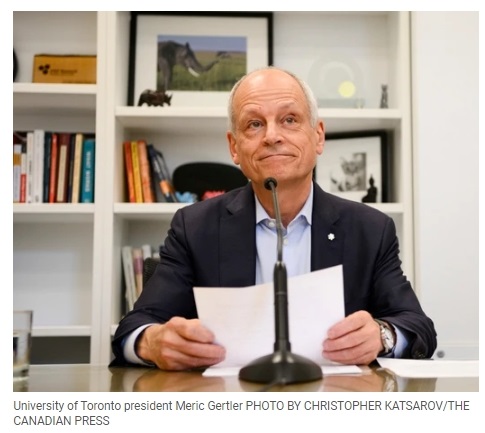By Conrad Black
Ontario Superior Court Judge Markus Koehnen granted the University of Toronto’s request for an injunction authorizing police enforcement of the university’s demand that the anti-Israel encampment on its campus be removed. Although the university had complained of antisemitic signs and slogans and verbal abuse and intimidation, the judge rejected these claims and obtusely construed the case as one that pitted the university’s claim that the encampment was a form of unlawful trespass, against the claim of the occupiers, an informal coalition of anti-Israel and other protest groups, that what they were doing constituted a legitimate exercise of their constitutional right to freedom of expression.
 The decision does constitute progress, but it is far from an adequate treatment of the subject. Of course, the argument that freedom of expression includes the freedom to occupy the main square of one of this country’s leading universities for months by a group of people including a substantial number who had nothing to do with the university community, in order to insult an ethnic group, in the guise of objecting to Israel’s actions in Gaza, is nonsense. The university provided assistance to the occupiers and their allies in evaluating U of T’s investment program and determining whether it included investments that further what was outrageously described as Israel’s “apartheid policies.” The university expressed its preparedness to tolerate demonstrations each day other than between 11 p.m. and 7 a.m., which the judge saw as a fair balance between the protesters’ right to demonstrate and the right of students living on campus to get some sleep.
The decision does constitute progress, but it is far from an adequate treatment of the subject. Of course, the argument that freedom of expression includes the freedom to occupy the main square of one of this country’s leading universities for months by a group of people including a substantial number who had nothing to do with the university community, in order to insult an ethnic group, in the guise of objecting to Israel’s actions in Gaza, is nonsense. The university provided assistance to the occupiers and their allies in evaluating U of T’s investment program and determining whether it included investments that further what was outrageously described as Israel’s “apartheid policies.” The university expressed its preparedness to tolerate demonstrations each day other than between 11 p.m. and 7 a.m., which the judge saw as a fair balance between the protesters’ right to demonstrate and the right of students living on campus to get some sleep.
Judge Koehnen failed to find any persuasive evidence that those temporarily residing in the encampment were motivated by antisemitism. This, too, is utter nonsense. There is overwhelming evidence from scores of authentic members of the university community, faculty and students that Jews, or those suspected of being Jews, were being harassed, threatened and insulted, and that many students have elected to attend virtual classes out of concern for their own safety or the stressful annoyance of being insulted and threatened. The president of the university, Meric Gertler, and Judge Koehnen were aware of this.
First published in the National Post
- Like
- Digg
- Tumblr
- VKontakte
- Buffer
- Love This
- Odnoklassniki
- Meneame
- Blogger
- Amazon
- Yahoo Mail
- Gmail
- AOL
- Newsvine
- HackerNews
- Evernote
- MySpace
- Mail.ru
- Viadeo
- Line
- Comments
- SMS
- Viber
- Telegram
- Subscribe
- Skype
- Facebook Messenger
- Kakao
- LiveJournal
- Yammer
- Edgar
- Fintel
- Mix
- Instapaper
- Copy Link







One Response
Sounds like “Hear no evidence, see no evidence”. Meanwhile, the more subtle “qualitative” aspects of the Law appear to be viewed more and more through an opaque glass.